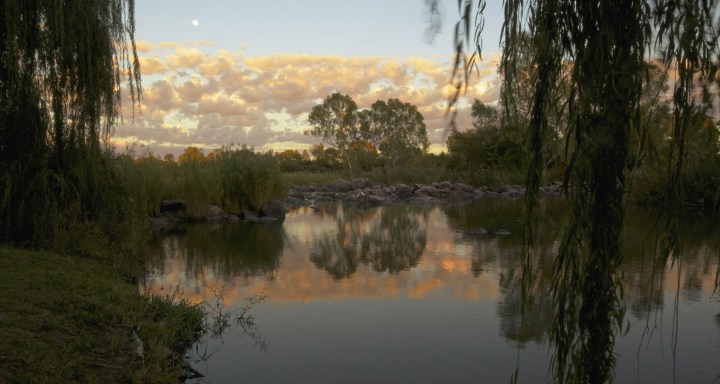Vaal River Pollution
Army experts step in to assist Emfuleni municipality with sewage problems

Battling to contain the Vaal River sewage pollution, the government and Emfuleni Municipality have deployed SANDF experts to tackle the massive infrastructural problems at the area's treatment works and keep away vandals and thieves.
Two hundred soldiers began work repairing water purification systems in the Emfuleni area on Monday in a bid to stop the flow of raw sewage into the Vaal River System.
This follows a visit to the area by Defence Minister Nosiviwe Mapisa-Nqakula on Friday and the promise to deploy specialist army personnel to the area by Finance Minister Tito Mboweni during his mini-budget speech in October.
Ageing infrastructure, vandalism and theft have left water treatment works in the area dysfunctional and unable to provide clean water to local communities. So dire is the situation that sewage is spilling into streets, homes and schools. A local nurse has also raised concern about the potential for disease outbreaks.
The deployment of army personnel, including engineers, in the area follows years of sewage-related problems which the community and non-governmental organisations like Save the Vaal have been battling to get addressed. They have taken their fight to the court which has ruled in their favour but the municipality and provincial department has failed to comply with rulings, often citing budget constraints.
According to Malcom Plant, chairperson of Save the Vaal, at the heart of the problem is a lack of funds and equipment to carry out day-to-day repairs and maintenance to vehicles and purchase fuel. A shortage of trained manpower and vandalism compound the problem.
Plant said the collapse of the infrastructure has resulted in a sea of raw sewage spilling into the Vaal River, which supplies water to millions of people. Save the Vaal have for the past several years been trying to compel the municipality and the department of Water and Sanitation, through negotiations and court orders, to fix the water treatment plants and to not allow spillages to occur.
The organisation is currently in possession of seven court orders compelling the municipality and the department of water and sanitation to fix the problem. The latest order, issued in February 2018, compelled the municipality to fix and maintain the sewer system and prevent spillages.
“The court orders have not been adhered to, and we were in the process of revising our options to return to court to request the court to compel the relevant parties to abide by the order or face contempt of court,” said Plant.
According to News24, Co-operative Governance and Traditional Affairs (Cogta) Deputy Minister, Obed Bapela, conceded that the Vaal River contamination was a national crisis and said national intervention was needed. “If this river is left like this, it has the potential to contaminate (drinking) water to over four provinces which it flows in.”
And during her visit on Friday, Mapisa-Nqakula admitted that indeed there was a challenge in this and other areas and that intervention was under way.
“Let’s start by saying, yes there is a challenge in the Vaal. There is a particular challenge in this municipality. It’s not as though nothing is being done. Something was being done, but clearly there is no capacity to deal with the issues fully,” Mapisa-Nqakula said.
The decision to rope in the army was motivated by the urgent need to protect the water purification infrastructure and immediately implement the necessary repairs to the ageing and damaged water treatment infrastructure, Mapisa-Nqakula said. She added that the army was not taking over the municipality nor would it be doing community patrols.
“Obviously, we as Cabinet take cognisance of the fact that the infrastructure in the country is ageing. This infrastructure which was there, which was built at the time to accommodate smaller numbers than what we have now. The military is not here to declare this place a military zone. The military is not here to do patrols in the area because there are no such challenges in Emfuleni.” Mapisa-Nqakula said.
She said the reason to rope in army personnel was triggered by the fact that they were sufficiently capable to deal with the area’s immediate challenges as soon as possible.
According to the minister, on Tuesday two primary putrid tanks will be repaired to exhibit to communities in the Vaal the SANDF’s commitment to executing the task at hand.
The rehabilitation project is expected to continue through to December 2019.
The Vaal River pollution has drawn the attention of the South African Human Rights Commission. The commission opened a probe in September regarding whether or not the pollution o the Vaal River violated human rights.
The Organisation Undoing Tax Abuse (OUTA) made a submission to the Human Rights Commission, calling the situation at the municipality a human rights disaster. The commission’s investigation is continuing and report is expected next year.
While the SANDF continues with its repairs, and the commission’s investigation continues, residents will continue to live with raw sewage flowing down their streets.
Thandiwe Radebi, 35, who has been living in Sebokeng for five years says she can’t let her baby crawl around her house as it might crawl to the sewage that runs past her home.
A nurse at the Johan Heyns Clinic in the Vaal, who spoke on condition of anonymity, said the health situation was getting out of hand.
“The Vaal River pollution crisis is cause for great concern, especially considering the size of the population against the number of clinics in the municipality. If there would be a serious cholera outbreak, which is not a distant possibility considering that the problem seems to worsen by the passing of each day, I doubt our local health institutions would be able to manage it.”
The Emfuleni Municipality was placed under administration in June which means it now falls under the authority of the Premier’s office and the Co-operative Governance and Traditional Affairs department (COGTA). DM


















 Become an Insider
Become an Insider